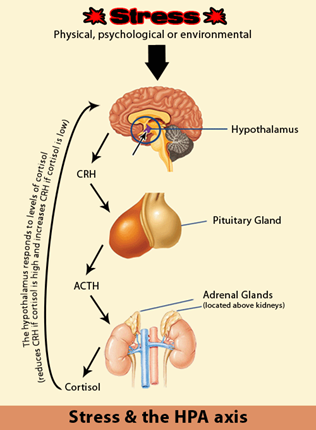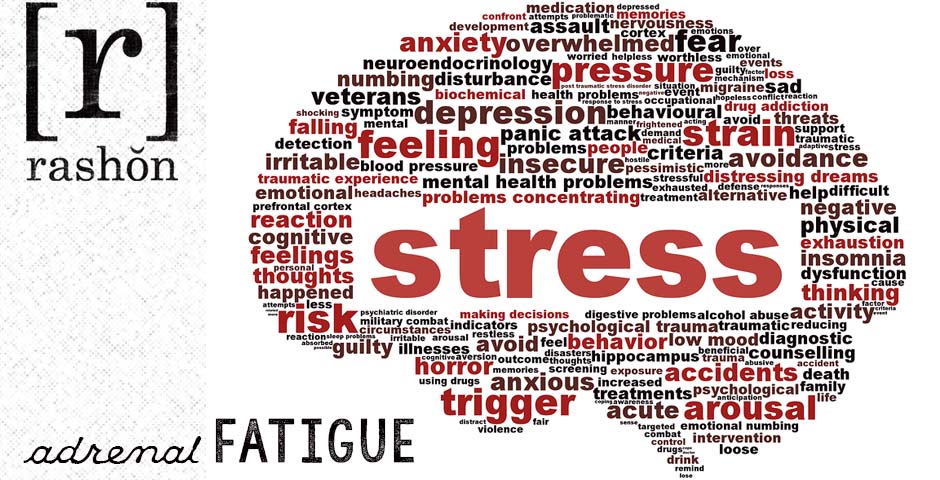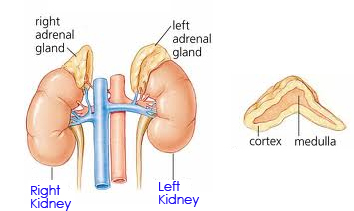Adrenal Fatigue has become a buzz word in the past few years. Many people know of adrenal fatigue, or have experienced it, while others have never heard of it. Unfortunately, I have been dealing with this myself, along with thyroid dysfunction and some other hormone imbalances, over the past 6 months or so.
While I had noticed some symptoms as early as March of this year, it took me until August to really take a step back and assess what was going on. I tend to just keep pushing through until I’m forced to stop, and my body definitely hit its breaking point a couple of months ago. Before I get further into my own story, let’s talk a bit about what the adrenal glands are, and how they work.
The adrenal glands are triangle-shaped glands that sit on top of the kidneys. Each adrenal gland is made up of the adrenal cortex and the adrenal medulla. The adrenal cortex manages the stress response by producing corticosteroids, which include cortisol, aldosterone and DHEA, along with sex hormone precursors testosterone, estrogen and progesterone. The adrenal medulla is responsible for releasing catecholamines – norepinephrine and epinephrine – in response to stress.
The adrenal glands are part of the endocrine system. The endocrine system is comprised of the Hypothalamus, the Pituitary Gland, the Pineal Gland, the Thyroid, the Parathyroid, the Adrenal Glands, the Pancreas, the Ovaries or Testes and the Kidneys. The Endocrine System is responsible for secreting hormones into our bloodstream and regulating those hormones. Proper hormone balance is vital for metabolism, stress response, reproduction, blood sugar control, and bone building and resorption.
The HPA Axis and Stress
The Hypothalamus-Pituitary-Adrenal (HPA) Axis is the feedback loop that mediates our response to stress, as well as our circadian rhythm. In the simplest of terms, in times of stress, the hypothalamus sends a signal to the pituitary gland, which then sends a signal to the adrenal glands to release cortisol. The primary function of cortisol is to increase blood sugar, suppress the immune system, and to aid in protein, fat and carbohydrate metabolism. The rush of cortisol into our system is what allows our bodies to continue to function and operate during times of stress. The hormones released from the adrenal glands are what give us the fight or flight response. 
Stress is defined as the nonspecific response of the body to any demand, whether it is caused by, or results in, pleasant or unpleasant conditions. Stress can be positive and negative in nature. Emotional or psychological stressors might include marital stress, death of a loved one, depression, financial pressure, negative attitudes or other traumas. Some physical stressors would be chronic illness, infections, viruses, surgery, chronic inflammation, lack of sleep or lack of exercise. Dietary factors such as nutrient-poor foods, blood sugar imbalances, food allergies, or excess caffeine or sugar can cause stress in the body. Excessive exercise, drugs (both pharmaceutical and recreational) and other stimulants can cause a stress response. When the stress response is triggered, it leads to specific responses in the body.
When chronic stress is an issue, the HPA Axis is constantly sending the adrenals the signal to produce its corticosteroids and catecholemines. Approximately 80-90% of the stress response occurs from the actions of epinephrine and cortisol. When the adrenal hormones are out of balance, they disturb the balance of all other hormones including insulin, thyroid, reproductive, and the neurotransmitters. Chronic stress is indicated by blood sugar imbalances, low thyroid function, reduced fertility and depression. Elevated levels of cortisol in the body can cause impaired cognitive function (poor memory and fuzzy thoughts), interference with healing, sleep disruption, increased abdominal fat, elevated blood pressure and lowered immune function among other symptoms. Eventually, our adrenals are left overworked and our hormone levels are all out of whack.
As you can see, stress plays a major role in our overall health. It’s important to find ways to manage stress in order to keep ourselves healthy.
Next week, in Part 2 of this series, I will talk about some of the signs of adrenal fatigue and ways to help your body heal and recover. I will also be telling a bit more of my own story, and what has helped me personally.
Have you experienced adrenal fatigue?





0 Comment